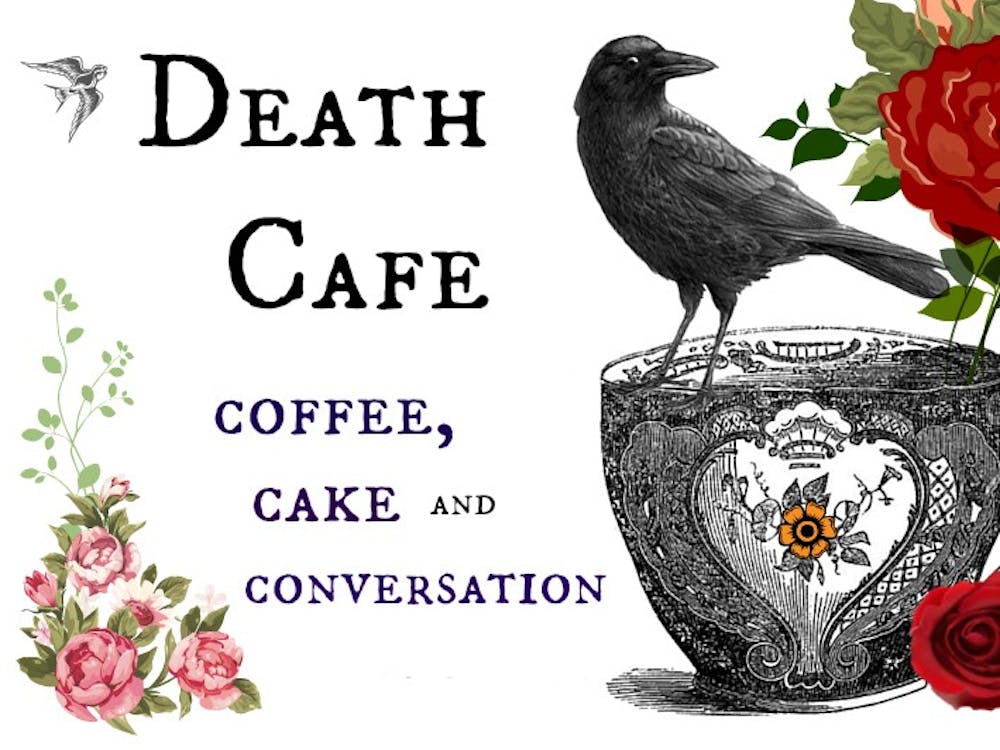Nine months into a year characterized by a global pandemic, many of us have been thrust uncomfortably close to the idea of death — much closer than six feet. National and global death tallies are repeatedly plastered on our news and social media feeds. Right now, an open chat with strangers about death may be just what we didn’t know we needed.
Death Café is a place to “gather to eat cake, drink tea and discuss death,” according to the organization’s website. It is a place to share your thoughts on death in an agenda-less and pressure-free conversation. British mother-and-son duo Susan Barksy Reid — a counselor trained in psychotherapy — and Jon Underwood founded the project in September 2011. Underwood first began working on the Death Café project in 2010, modeling it after Bernard Crettaz’s Café Mortel, which he discovered in an Independent article.
Following Underwood’s own death in June 2017, his mother and sister, Jools Barsky, have continued running Death Café. On July 19, 2012, Lizzy Miles of Columbus, Ohio hosted the United States’s first Death Cafe. She is still an active member, hosting Cafés herself and mentoring other Death Café hosts across the world. Megan Mooney is another influential member of the American branch of the Death Café project; she runs the official Death Café Facebook. In addition to her work with Death Café, Mooney is a social worker and conducts end of life research.
Living Arts Collective, a hub for engaging in the artistic community of Durham, hosted a Café Aug. 16. The collective holds a variety of events that encourage wellness, artistic expression and, well, life. So why would an organization that literally has ‘living’ in its name associate itself with an event centered around death? Among the many arts programs it sponsors, Living Arts Collective holds events categorized as “healing arts.” With the mission of “increas[ing] awareness of death with a view to helping people make the most of their (finite) lives,” Death Café certainly has its place in the art of healing.
Social distancing mandates have made the traditional Death Café model less feasible. Nevertheless, Death Cafés are thriving. Virtual events around the nation are as easy to attend as scrolling through the Death Café’s “Forthcoming” page and finding one that fits your schedule.
Often, multiple Death Cafés are being held everyday. Megan Miller and Andi Earl of Lansing, Mich. have been active Death Café participants and hosts for approximately two years and have several Death Cafés planned through the rest of 2020, including two in the first week of September. Earl emphasized the increased accessibility that a virtual platform provides.
“We had one woman call in from Russia, another one from Hungary,” Earl said. “So you’re getting to meet people you wouldn’t have otherwise met in a non-COVID world.”
Virtual Cafés are not always ideal, however. Earl mentioned “the lull,” or silence that feels comfortable in person but translates to “dead air” over Zoom.
“When people are emotional… there’s that loss of physical touch,” Earl said. “You can’t hug someone… or hand them a tissue, even.”
Earl also discussed the limitations of a virtual Death Cafe. Not everyone has access to the internet, she mentioned, excluding them from the conversation for the time being.
If you want to get involved beyond attending a Death Café, you can easily host one yourself. Death Café hosts do not need any special qualifications — a Café solely deals in the personal views on death and dying of its attendees.
Death Café is a unique program that may be able to bring personal clarity to those of us who have struggled with death in their families or communities, or simply the concept of it - that number has likely grown substantially due to COVID-19. It might open a dialogue that some of us have never had the opportunity to explore before coming to Duke. What is college if not a time to have potentially uncomfortable conversations and learn new perspectives?
The fact is that whoever you are, wherever you come from, death is a reality — but it does not have to be a painful one. Death has already claimed several people in my life, and I suspect that I am in good company. At some point, everyone dies. Let’s talk about it!
Get The Chronicle straight to your inbox
Sign up for our weekly newsletter. Cancel at any time.

